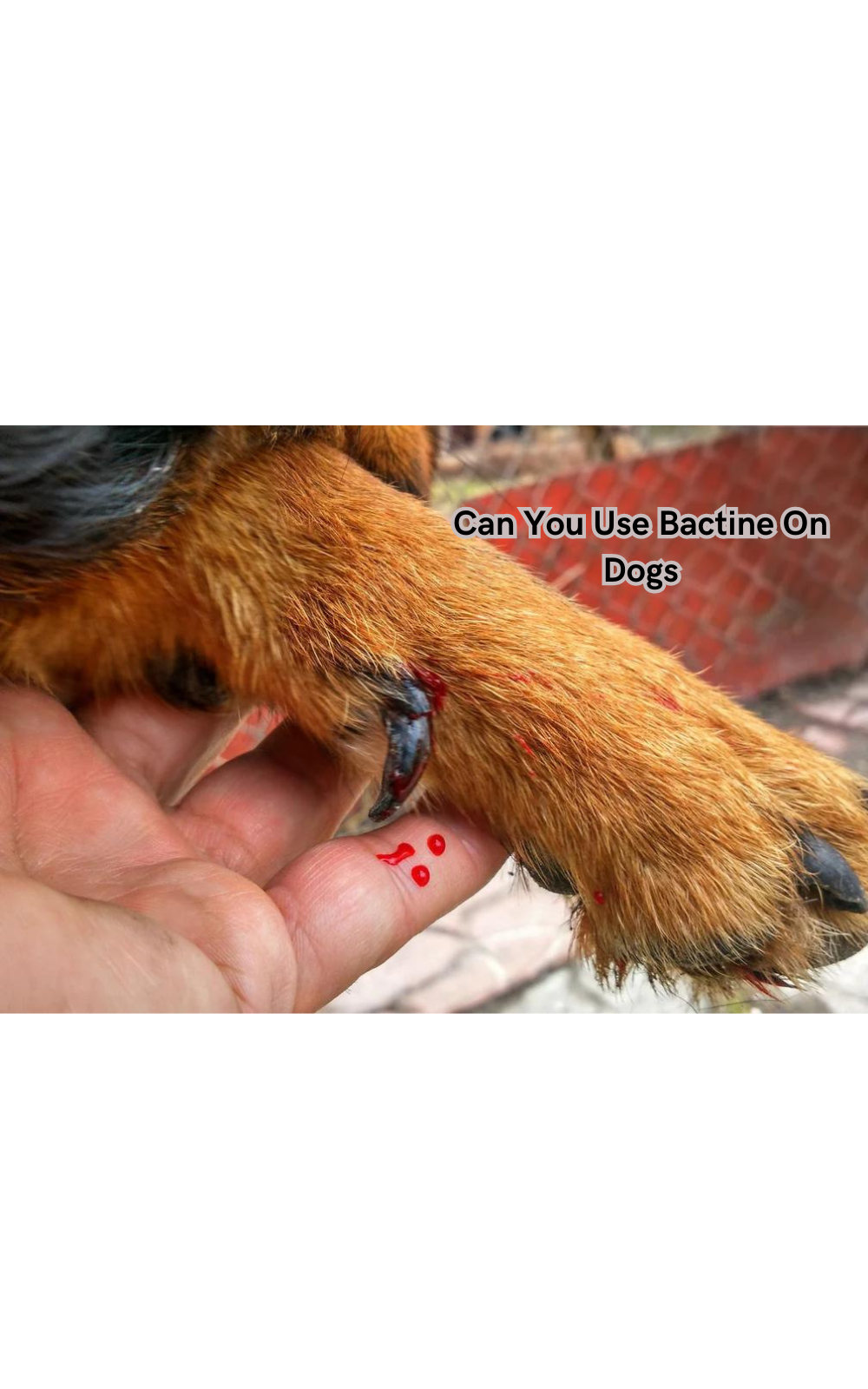Can You Use Bactine On Dogs
This introduction will explore the considerations and precautions associated with using Bactine on dogs, shedding light on its suitability, potential benefits, and any associated risks, providing valuable insights for pet owners seeking optimal wound care solutions for their beloved pets.

Introducing Bactine for dogs—a topical antiseptic that has gained attention for its potential use in treating minor wounds and skin irritations in canine companions.
While humans commonly use Bactine to clean and disinfect cuts and scrapes, pet owners may wonder whether it's safe and effective for their furry friends. Understanding the compatibility of Bactine with canine physiology and skin types is crucial for responsible pet care.
This introduction will explore the considerations and precautions associated with using Bactine on dogs, shedding light on its suitability, potential benefits, and any associated risks, providing valuable insights for pet owners seeking optimal wound care solutions for their beloved pets.
What Is Bactine?
Bactine is an over-the-counter antiseptic spray or liquid that contains the active ingredients benzalkonium chloride and lidocaine. Humans primarily use it to clean and disinfect minor wounds, such as cuts, scrapes, and insect bites.
Combining these two ingredients helps to soothe pain and prevent infection in the affected area. When applying on the wound, gently dab the Bactine on the wound until it is thoroughly wet. You can also use a spray bottle to apply the liquid form of Bactine.
As Bactine is a topical solution, it is intended for external use only and is not meant to be ingested or administered orally. Bactine promote wound healing in humans by killing bacteria on the skin's surface and providing pain relief on minor cuts.
Can You Use Bactine On Dogs?
The short answer is yes, Bactine can be used on dogs in certain situations. However, it is important to understand the potential risks and precautions associated with using this product on our canine companions.
Firstly, it is crucial to consult with a veterinarian before using any medication or treatment on your dog. They will be able to provide personalized advice based on your dog's individual health needs and any potential interactions with other medications they may be taking.
Additionally, not all dogs will respond well to Bactine. Some canines may experience an allergic reaction to the ingredients or show signs of irritation when the product is applied to their skin. It is important to closely monitor your dog's reaction when using Bactine for the first time and discontinue use if any adverse effects occur.
Furthermore, Bactine should only be used on minor wounds and skin irritations. It is not suitable for more serious injuries or infections, and it is not a substitute for proper veterinary care. If your dog has a deep cut or significant open wound, it is best to seek professional treatment from a veterinarian.
Potential Benefits of Using Bactine on Dogs
When used correctly and with the supervision of a veterinarian, Bactine can provide several benefits for dogs. These include:
- Pain relief: The lidocaine in Bactine helps to numb pain receptors in the affected area, providing temporary relief from discomfort. In dog wounds, this can be especially useful in reducing the urge to lick or scratch at the injury.
- Antiseptic properties: Benzalkonium chloride is a potent antiseptic that can help prevent infection in minor wounds and skin irritations. Flea bites, cuts from scratches, and other minor injuries can be susceptible to bacteria, and Bactine can help reduce this risk.
- Easy application: Bactine comes in a convenient spray or liquid form, making it easy to apply to your dog's skin without causing further discomfort.
Precautions When Using Bactine on Dogs
While there are potential benefits of using Bactine on dogs, there are also precautions that pet owners should be aware of to ensure their dog's safety and well-being. These include:
- Consulting with a veterinarian: As mentioned earlier, it is important to seek advice from a veterinarian before using Bactine on your dog. They can provide guidance on proper usage and any potential risks or interactions. Pet store employees or online sources may not have the necessary expertise to give accurate advice.
- Checking for allergies: Before applying Bactine, conduct a small patch test on your dog's skin to check for any signs of an allergic reaction. If your dog shows any adverse effects, discontinue use immediately.
- Avoiding contact with the eyes and mouth: Bactine is not meant to be ingested or come into contact with the eyes. Be sure to keep it away from these areas when applying it to your dog's skin.
- Properly cleaning the affected area: Before using Bactine, make sure to clean the affected area with water and a mild soap. This will help remove any dirt or debris and ensure that the product can work effectively.
To prevent infections and promote proper wound healing, it is important to closely follow these precautions and seek professional veterinary care if you have any concerns about your dog's mouth, health, eyes, and ears.
Other Uses of Bactine On Dogs
Aside from treating minor wounds and skin irritations, there are a few other potential uses for Bactine on dogs. These include:
Hot spots:
Bactine can help soothe the discomfort and promote the healing of hot spots in dogs. However, it is crucial to consult with a veterinarian first to determine the underlying cause of these lesions.
Ear infections:
In some cases, veterinarians may recommend using Bactine as an ear cleaner for dogs with mild ear infections. However, this should only be done under professional supervision to prevent further damage to the ear canal.
Yeast infection:
Bactine may also be recommended by a veterinarian to help alleviate the symptoms of yeast infections in dogs. However, this should only be used as a temporary solution, and proper treatment from a veterinarian is necessary for long-term relief.
Insects' bites:
Bactine can be applied to insect bites on dogs to help reduce itching and prevent infection in the affected area. Again, it is essential to consult with a veterinarian if your dog experiences any severe reactions or discomfort from the bite.
Skin rashes:
In some cases, Bactine may be recommended by a veterinarian to help soothe and promote the healing of skin rashes in dogs. However, it is essential to determine the underlying cause of the rash and address it accordingly. Dry skin, allergies, and other skin conditions may require specific treatments.
Poison ivy:
If your dog comes into contact with poison ivy, Bactine can be used to help reduce itching and prevent secondary infections. However, be sure to consult with a veterinarian if the reaction is severe or widespread. If you do not approach the vet ASAP, it may become severe, and treatment will be expensive.
Worn Paw Pads and Staph infections:
Bactine may be recommended by a veterinarian to help soothe and promote the healing of worn paw pads or staph infections in dogs. However, proper care and treatment are necessary to prevent these issues from recurring.
So try Bactine to fix your furry friend's minor wounds and skin irritations, but always remember to consult with a veterinarian first for proper guidance and care. Tea tree oil and aloe vera have been proven to be beneficial for canine skin health.
Signs And Symptoms Of Bactine Ingestion:
While Bactine is safe for external use on dogs, ingestion can be harmful and even toxic. If your dog accidentally ingests Bactine, it is essential to watch out for the following symptoms:
- Vomiting
- Diarrhea
- Lethargy or weakness
- Difficulty breathing
If your dog shows any of these signs after ingesting Bactine, seek immediate veterinary care. Ingestion of Bactine can be life-threatening and should not be taken lightly.
FAQs
What is the best disinfectant for dog wounds?
The best disinfectant for dog wounds will vary depending on the severity and type of wound. Bactine is a popular option as it can help reduce the risk of infection and promote healing while being safe for dogs when used correctly.
Can I use Dettol on my dog?
It is not recommended to use Dettol on dogs as it is a strong disinfectant that can be harmful if ingested or applied directly to the skin. It is always best to consult a veterinarian before using new products on your dog. Maybe Dettol has a foul odor for the dog's sensitive nose.
How can I treat my dog's wound at home?
For minor wounds, clean the affected area with water and a mild soap before applying a small amount of Bactine. However, it is always best to consult with a veterinarian for proper care and treatment of any wound on your dog.
Can I use a Bactine liquid bandage on dogs?
While Bactine liquid bandages may be safe for dogs, it is best to consult with a veterinarian before using any new products or treatments on your dog's wounds. Your veterinarian can provide guidance and ensure the safety of your furry friend.
Conclusion
In conclusion, the decision to use Bactine on dogs should never be taken lightly. While it may have benefits in certain circumstances, the well-being of our canine companions is paramount. Seeking professional veterinary advice is crucial before applying human medications or animal treatments.
Veterinarians can provide tailored guidance based on the dog's specific needs and health status, ensuring their safety and comfort. Additionally, they can recommend pet-specific antiseptic products designed to address various wounds and skin conditions.
By prioritizing the expertise of veterinary professionals, pet owners can confidently navigate the complexities of wound care, promoting the best possible outcomes for their beloved four-legged friends. Remember, when in doubt, always consult with a veterinarian for the well-being of your furry companion.
